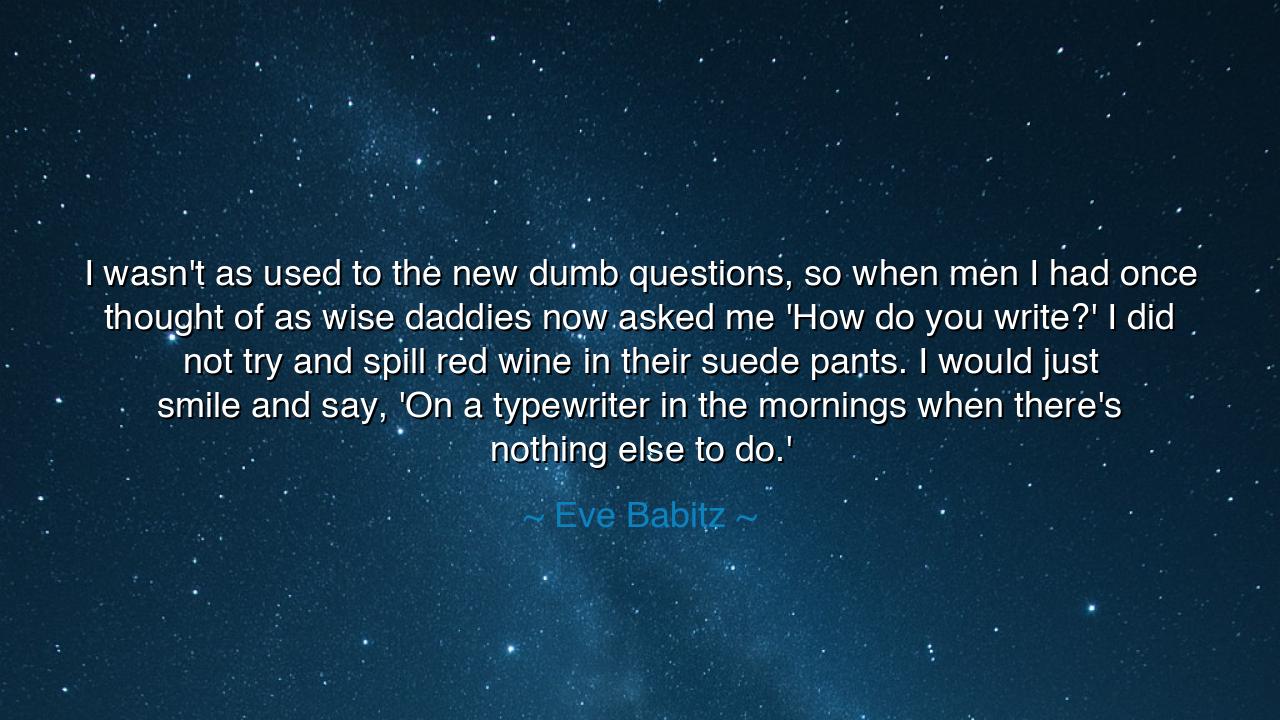
I wasn't as used to the new dumb questions, so when men I had
I wasn't as used to the new dumb questions, so when men I had once thought of as wise daddies now asked me 'How do you write?' I did not try and spill red wine in their suede pants. I would just smile and say, 'On a typewriter in the mornings when there's nothing else to do.'






Hear the voice of Eve Babitz, a woman of wit and sharp perception, who dwelt in the glittering heart of Los Angeles and turned its illusions into literature: “I wasn't as used to the new dumb questions, so when men I had once thought of as wise daddies now asked me ‘How do you write?’ I did not try and spill red wine in their suede pants. I would just smile and say, ‘On a typewriter in the mornings when there's nothing else to do.’” At once playful and cutting, her words reveal the dance between genius and condescension, between patience and rebellion, between the woman who creates and the world that tries to diminish her art.
The meaning of her truth begins with the question: “How do you write?” Such a question, on the surface, may seem innocent. Yet when asked by those who should know better, by men who once carried the air of authority, it becomes a subtle insult—an insinuation that art is mere mystery, accident, or feminine curiosity rather than discipline and craft. In her smile and her wry reply, Babitz refuses to surrender the dignity of her art to their ignorance. Instead of fury, she arms herself with irony, deflating the condescension without yielding her power.
This dance of irony recalls another tale from history: that of Dorothy Parker, the great wit of the Algonquin Round Table, who too faced trivial questions and dismissals in a world dominated by men. When asked absurdities, Parker did not rage but replied with stinging humor, her tongue sharper than any blade. Both Parker and Babitz knew the cost of being a woman who wrote in a society where men believed themselves custodians of wisdom. Their smiles were not signs of submission, but shields of strength, masking defiance with elegance.
Babitz also reveals the transformation of her own spirit. She confesses that once, such questions may have driven her to rebellion, to spilling wine in suede as an act of protest. But time and experience taught her a subtler form of resistance: not to waste her fire on petty slights, but to answer with calm dismissal. The typewriter in the mornings is her truth—it reduces the mysterious act of writing to a mundane routine, stripping away their attempt to mystify or belittle it. Her answer is both humble and triumphant: creation comes not from magic but from daily devotion, from showing up when “there’s nothing else to do.”
There is a profound teaching here about discipline. Many imagine that art comes from inspiration, from lightning in the veins. But Babitz insists, with sly irony, that it is simply a matter of sitting at the keys, of working in the mornings, of treating writing as part of life’s fabric rather than its exalted pedestal. By reducing the grand question to a plain reply, she teaches that greatness is not in asking how, but in doing—again and again, until the words themselves take shape.
The lesson for us is clear. When the world questions your worth, when it trivializes your craft or disguises condescension as curiosity, do not waste your soul in rage. Instead, answer with quiet power, with clarity, with the calm assertion of your truth. Smile when they doubt you, not as surrender, but as a declaration that their doubts do not wound you. And then return to your craft—whether typewriter, brush, or labor—knowing that the proof of your worth lies in what you create, not in what they think of you.
Therefore, let each one act thus: be steadfast in your discipline, deflect ignorance with grace, and honor your craft with daily devotion. Do not chase the approval of the “wise daddies,” for their crowns are hollow. Instead, crown yourself with the joy of work well done, with the quiet triumph of creation.
Thus, the teaching is eternal: Greatness does not arise from questions or approval, but from daily discipline. When met with ignorance, the wise do not spill their wine in anger, but smile, reply with irony, and return to their art. For the true answer to “How do you write?” is not explanation, but the work itself.






AAdministratorAdministrator
Welcome, honored guests. Please leave a comment, we will respond soon